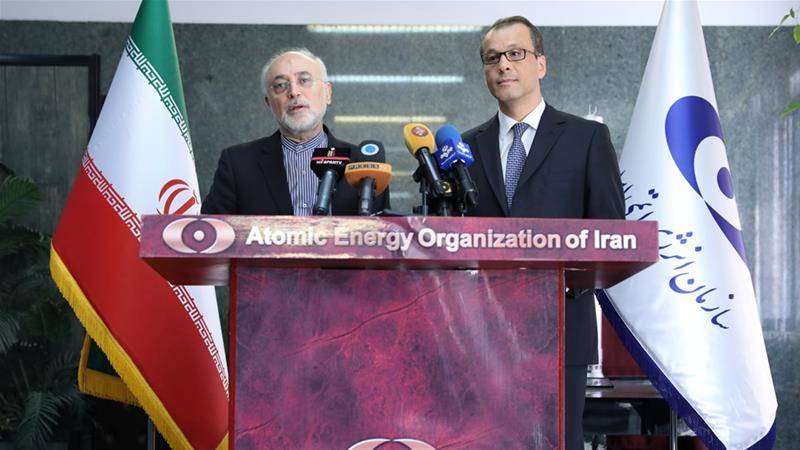A ban on the sale of conventional weapons to Iran was introduced alongside the Joint Comprehensive Plan of Action (JCPOA, also known as nuclear deal) when it was signed in 2015. Now that the temporary ban is set to expire, the US has been trying to ensure its continuation via a UN Security Council resolution, which was rejected, and is attempting to trigger a "snapback" sanctions mechanism.
This mechanism was also created as part of the JCPOA and was supposed to be enacted should Iran violate its provisions, reinstating all international sanctions. While Iran indeed exceeded the enrichment levels of uranium this year, it did so after the EU and other signatories failed to protect its economy from the sanction the US enacted after ditching the nuclear deal in 2018. Tehran, Moscow, and Beijing insist that Washington has no right to trigger "snapback" sanctions since it left the accord two years ago, putting it on the verge of collapse.
Iran's FM says U.S. has "no right" to restore sanctions
Iran's Foreign Minister Mohammad Javad Zarif said in a letter to the rotating chairman of the United Nations Security Council (UNSC) that the U.S. has "no right" to restore sanctions on Iran, official IRNA news agency reported on Friday.
"The Dispute Resolution Mechanism is only open to the actual JCPOA participants," Zarif said in the letter which was written on Thursday and made public by the Iranian Ministry of Foreign Affairs on Friday.
U.S. officials have recently claimed to remain a "participant" in the Joint Comprehensive Plan of Action (JCPOA) by force of UNSC Resolution 2231, with the intention of initiating the JCPOA's Dispute Resolution Mechanism and re-imposing UNSC sanctions on Iran.
Zarif added that the U.S. has violated both the JCPOA and Resolution 2231 by withdrawing from the JCPOA, unilaterally reimposing sanctions on Iran, "and even punishing those complying with the resolution."
On the contrary, Iran has showed good faith in continuing "full implementation" of the JCPOA for "a full year" after the U.S. withdrawal and only applied "remedial measures" afterwards.
EU to work with remaining parties to save Iran nuclear deal: Borrell
Josep Borrell, the High Representative of the European Union (EU) for Foreign Affairs and Security Policy, has affirmed that the bloc will work to preserve the Iran nuclear deal after the United States sought to reimpose sanctions on Iran.
He made the remarks in a telephone conversation with Russian Foreign Minister Sergey Lavrov on Thursday, the EU's external action service (EEAS) said in a press release on Friday.
Talking to Lavrov, Borrell reaffirmed his determination to continue to work with Russia, the other remaining participants of the Joint Comprehensive Plan of Action (JCPoA) and the international community to preserve the agreement.
The EU's external action service announced on Friday that a meeting of the Joint Commission of the JCPoA will take place in Vienna, Austria on Sept. 1, attended by delegates of China, France, Germany, Russia, the United Kingdom and Iran.
Early on Thursday, the U.S. sent a letter to the UN Security Council requesting to initiate the "snapback" mechanism, which allows a participant to the JCPoA to seek the reimposition against Iran of the multilateral sanctions lifted in 2015 in accordance with resolution 2231, adopted by the UN Security Council.
Borrell claimed in a statement on Thursday night that the U.S. had lost ground to trigger the "snapback" mechanism as it withdrew from the agreement in 2018.
"As coordinator of the JCPOA Joint Commission I will continue to do everything possible to ensure the preservation and full implementation of the JCPoA by all," said Borrell, underlining that the JCPoA remains a key pillar of the global non-proliferation architecture, contributing to regional security.
The JCPoA was inked by Iran in July 2015 with Britain, China, France, Germany, Russia and the United States, together with the EU. The U.S., under President Donald Trump, withdrew from the JCPoA on May 8, 2018, and unilaterally reimposed sanctions on Tehran, despite objections from the international community.
IAEA chief to visit Tehran next Monday
Director General of the International Atomic Energy Agency (IAEA) Rafael Mariano Grossi will travel to Tehran to meet with high-level Iranian authorities next Monday, IAEA said Saturday in a statement.
The visit will be the Director General's first to Iran since he took office last December, the statement said.
During his visit, Grossi will address the cooperation of Iran with the IAEA, and in particular Iran's provision of access to the agency's inspectors to requested locations, it said.
"I have decided to come personally to Tehran so that I can reinforce the importance of cooperation and the full implementation of all safeguards commitments and obligations with the IAEA," Grossi said in the statement.
"My objective is that my meetings in Tehran will lead to concrete progress in addressing the outstanding questions that the agency has related to safeguards in Iran and, in particular, to resolve the issue of access."
"I also hope to establish a fruitful and cooperative channel of direct dialogue with the Iranian Government which will be valuable now and in the future," he added.
Earlier in the day, Iran's ambassador and permanent representative to the Vienna-based IAEA Kazem Gharibabadi said Grossi will make an official visit to Iran.






